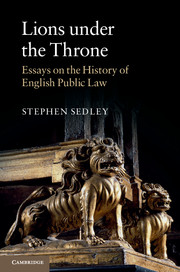Book contents
- Frontmatter
- Epigraph
- Dedication
- Contents
- Preface
- Introduction
- Part I Histories
- Part II Themes
- 6 The royal prerogative
- 7 The sovereignty of Parliament and the abuse of power
- 8 The right to be heard
- 9 The separation of powers
- 10 Public law and human rights
- 11 The state and the law
- 12 Standing and “sitting”
- 13 Law without courts: the tribunal system
- 14 The rule of law
- Index
7 - The sovereignty of Parliament and the abuse of power
from Part II - Themes
Published online by Cambridge University Press: 05 November 2015
- Frontmatter
- Epigraph
- Dedication
- Contents
- Preface
- Introduction
- Part I Histories
- Part II Themes
- 6 The royal prerogative
- 7 The sovereignty of Parliament and the abuse of power
- 8 The right to be heard
- 9 The separation of powers
- 10 Public law and human rights
- 11 The state and the law
- 12 Standing and “sitting”
- 13 Law without courts: the tribunal system
- 14 The rule of law
- Index
Summary
One of the future possibilities touched on in Chapter 5 was the development of a constitutionalism premised on the rule of law rather than solely on Parliamentary supremacy. This chapter looks at how, historically, this dualism has been managed, and at judicial control of abuses of power. A note is appended to it on the origin of the expression “ultra vires”.
Dr Bonham and the College of Physicians
Dr Bonham, a Cambridge-trained physician, set up a medical practice in London without the licence of the Royal College of Physicians. The college had him arrested and thrown into the Fleet prison. When he sued them for false imprisonment, the college censors pleaded their statute of incorporation, which empowered them to imprison or fine anyone who broke their regulations.
Although it was not necessary to his court's decision in favour of Bonham, Coke fastened on the impropriety of allowing a regulatory body to appropriate a share of the fines it imposed. Such a provision made every disciplinary cause the College's own and the College the judge of it. Coke's judgment in Bonham's Case denounces the impropriety of any such arrangement: it was an abuse of power, said Coke, and any fines should go to the Crown.
Parliament's powers
Had it stopped there, the case would still be important. Parliament today would never, one hopes, allow a statutory regulator to finance itself out of the fines it levied. But it was because, in Bonham's Case, Parliament had done just this that Coke confronted what is still a critical question in Britain: can even a sovereign Parliament legislate in violation of fundamental or natural law? Can it abuse its powers?
“In many cases,” said Coke, “the common law will control acts of parliament, and sometimes adjudge them to be utterly void: for when an act of parliament is against common right and reason, or repugnant, or impossible to be performed, the common law will control it, and adjudge such act to be void.”
- Type
- Chapter
- Information
- Lions under the ThroneEssays on the History of English Public Law, pp. 143 - 158Publisher: Cambridge University PressPrint publication year: 2015



